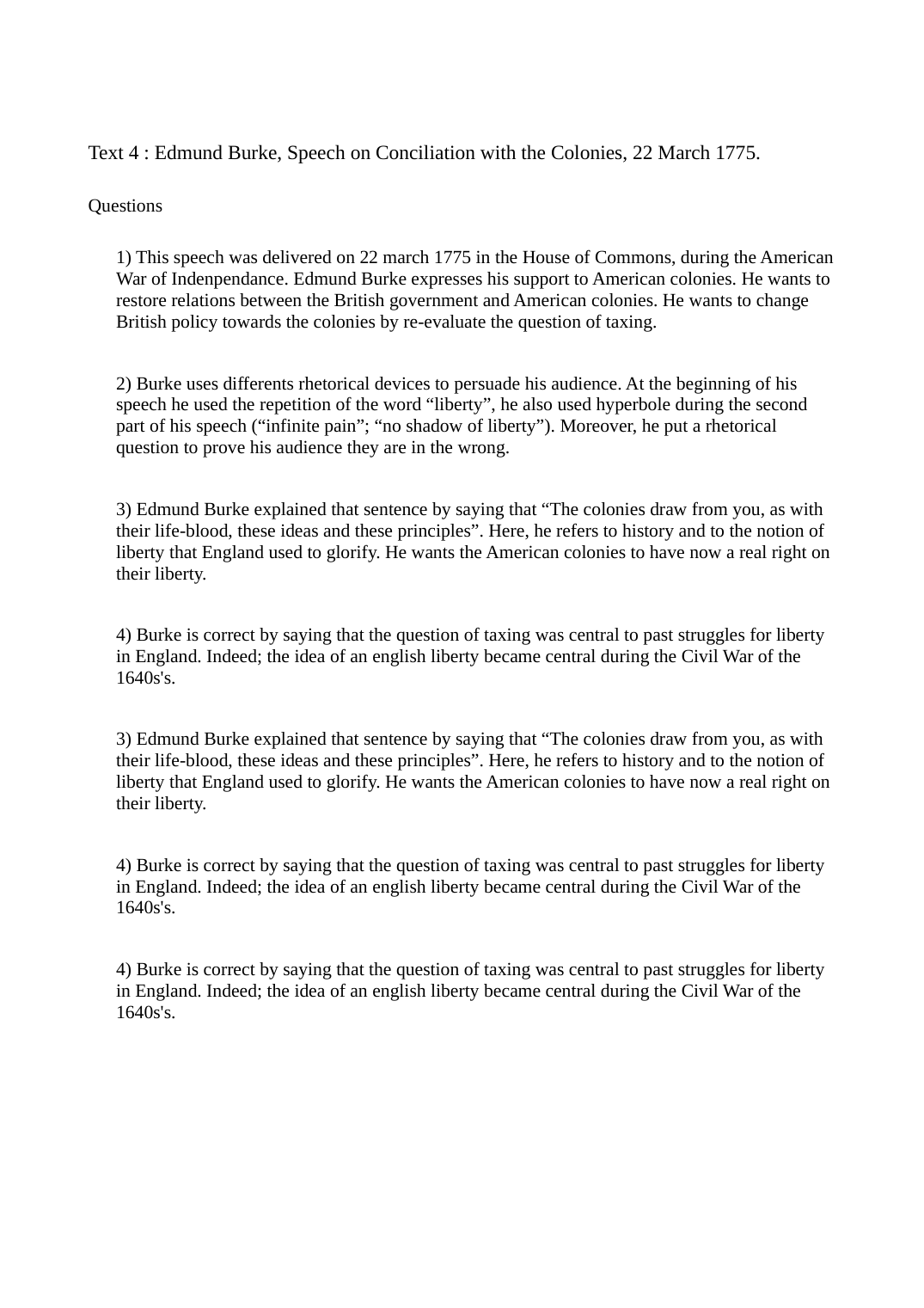Edmund Burke, Speech on Conciliation with the Colonies, 22 March 1775
Publié le 23/05/2020

Extrait du document
Ci-dessous un extrait traitant le sujet : Edmund Burke, Speech on Conciliation with the Colonies, 22 March 1775. Ce document contient 339 mots soit 1 pages. Pour le télécharger en entier, envoyez-nous un de vos documents grâce à notre système gratuit d’échange de ressources numériques. Cette aide totalement rédigée en format pdf sera utile aux lycéens ou étudiants ayant un devoir à réaliser ou une leçon à approfondir en Histoire-géographie.
Philosophe et homme politique anglais. Il fut élu au Parlement en 1765 et devint un des principaux chefs des whigs. Sa vie politique fut occupée par cinq « grandes, justes et honorables causes » : la défense de la Chambre des communes contre les empiétements abusifs de George III, l'émancipation des colonies d'Amérique, la défense des droits et des intérêts de l'Irlande catholique, la lutte contre les abus de la Révolution et surtout la lutte contre la Révolution française jusqu'au Directoire, ce qui le fit rompre avec les whigs en 1791. En 1790, il avait publié ses Reflections on the revolution in France qui connurent un succès considérable et qui rapidement furent traduites en français et en allemand. Pour Burke, la doctrine des droits de l'homme, même si elle était « métaphysiquement vraie » souffrait du défaut majeur d'être radicalement impraticable. Il leur opposait les droits acquis par les Anglais au cours de leur histoire, les réformes et les changements devant toujours s'appliquer au caractère de chaque nation et aux circonstances particulières. Burke sut prédire que le mouvement révolutionnaire aboutirait à une dictature militaire. Sa conception « organique » des institutions eut une grande influence sur les traditionalistes français J. de Maistre et L. de Bonald.
«
Text 4 : Edmund Burke, Speech on Conciliation with the Colonies, 22 March 1775.
Questions
1) This speech was delivered on 22 march 1775 in the House of Commons, during the American
War of Indenpendance.
Edmund Burke expresses his support to American colonies.
He wants to
restore relations between the British government and American colonies.
He wants to change
British policy towards the colonies by re-evaluate the question of taxing.
2) Burke uses differents rhetorical devices to persuade his audience.
At the beginning of his
speech he used the repetition of the word “liberty”, he also used hyperbole during the second
part of his speech (“infinite pain”; “no shadow of liberty”).
Moreover, he put a rhetorical
question to prove his audience they are in the wrong.
3) Edmund Burke explained that sentence by saying that “The colonies draw from you, as with
their life-blood, these ideas and these principles”.
Here, he refers to history and to the notion of
liberty that England used to glorify.
He wants the American colonies to have now a real right on
their liberty.
4) Burke is correct by saying that the question of taxing was central to past struggles for liberty
in England.
Indeed; the idea of an english liberty became central during the Civil War of the
1640s's.
3) Edmund Burke explained that sentence by saying that “The colonies draw from you, as with
their life-blood, these ideas and these principles”.
Here, he refers to history and to the notion of
liberty that England used to glorify.
He wants the American colonies to have now a real right on
their liberty.
4) Burke is correct by saying that the question of taxing was central to past struggles for liberty
in England.
Indeed; the idea of an english liberty became central during the Civil War of the
1640s's.
4) Burke is correct by saying that the question of taxing was central to past struggles for liberty
in England.
Indeed; the idea of an english liberty became central during the Civil War of the
1640s's..
»
↓↓↓ APERÇU DU DOCUMENT ↓↓↓
Liens utiles
- How do the three documents interact to deal with the intersection of multiple identities?
- Edmund Burke, « Première lettre sur les ouvertures de paix » (1796)
- Inde, avril 2006, série L, LV1: Tracy Chevalier, The Girl With A Pearl Earring, 2000.
- Denmark's prosperity depends on its trade with the European Union whichrepresents half of its exports.
- Two communities with different languages, Flemish, similar to Dutch, andWalloons, similar to French, share the territory.


